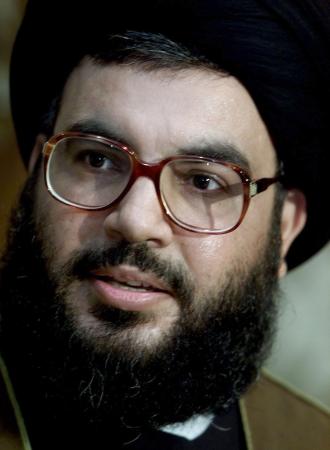Hezbollah says reconciliation does not mean new alliances
 Beirut - The leader of the Lebanese Shiite movement Sheikh Hassan Nasrallah said Friday his movement is ready for whatever it takes to implement peace and stability in Beirut, but ruled out new alliances with the anti-Syrian majority.
Beirut - The leader of the Lebanese Shiite movement Sheikh Hassan Nasrallah said Friday his movement is ready for whatever it takes to implement peace and stability in Beirut, but ruled out new alliances with the anti-Syrian majority.
"Reconciliation doesn't mean building new alliances," Nasrallah said in a speech to mark Jerusalem Day in a rally in Beirut's southern suburbs.
"We are ready to do whatever it takes to reassure all the Lebanese and especially the citizens of Beirut," Nasrallah stressed, adding "we are serious in and devoted to the reconciliation."
Rival Lebanese groups are attempting to reconcile - an effort that many officials in Beirut believe is only going to offer a temporary solution, until other regional problems are solved.
A major meeting between the leader of the anti-Syrian ruling majority Saad Hariri and Nasrallah is expected "soon," though no date has been announced.
It will be the first meeting of its kind in two years. They last had a face-to-face meeting in 2006, which was interrupted by the war with Israel in July the same year.
"The delays are caused by several security issues which are needed to be handled first. There are also negotiations on the geography of the meeting place," said member of parliament Ammar Houri, a member of the Hariri bloc.
During the speech, Nasrallah stressed that the Lebanese state should arm its forces even "by obtaining it from the black market as the resistance (Hezbollah) does."
"Can we build a strong and patriotic army capable of defending our territories by asking the American's and Israelis' permission to give us arms and equipments?" Nasrallah said.
Nasrallah reiterated that backing the resistance (Hezbollah) is essential because "the resistance is the only way to liberate Palestine and occupied lands by Israel."
Jerusalem Day is usually celebrated on the last day Friday of the fasting month of Ramadan. The goal of the celebration is to oppose Israel's capture of Jerusalem and its continuing rule over the city.
Anti-Zionist demonstrations are held on this day in some Muslim and Arab countries and by Muslim and Arab communities around the world, but especially in Iran where the occasion was first suggested.
The idea originated in Iran after the 1979 Islamic Revolution. The observance was suggested by Ayatollah Khomeini, then supreme leader of Iran, in August of that year. (dpa)